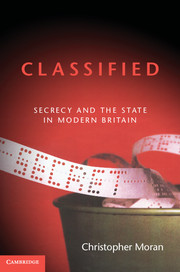Book contents
- Frontmatter
- Contents
- Illustrations
- Foreword
- Acknowledgements
- Abbreviations
- Introduction
- Part I 1889–1945
- Part II Secrecy and the press
- Part III Secrecy and political memoirs
- Part IV Intelligence secrets, spy memoirs and official histories
- 7 Keeping the secrets of wartime deception: Ultra and Double-Cross
- 8 SOE in France
- 9 Counterblast: official history of British intelligence in the Second World War
- Epilogue: from Wright to WikiLeaks
- Notes
- Bibliography
- Index
- Plate section
7 - Keeping the secrets of wartime deception: Ultra and Double-Cross
Published online by Cambridge University Press: 05 April 2013
- Frontmatter
- Contents
- Illustrations
- Foreword
- Acknowledgements
- Abbreviations
- Introduction
- Part I 1889–1945
- Part II Secrecy and the press
- Part III Secrecy and political memoirs
- Part IV Intelligence secrets, spy memoirs and official histories
- 7 Keeping the secrets of wartime deception: Ultra and Double-Cross
- 8 SOE in France
- 9 Counterblast: official history of British intelligence in the Second World War
- Epilogue: from Wright to WikiLeaks
- Notes
- Bibliography
- Index
- Plate section
Summary
The Ultra Secret was kept not merely during the war but for thirty years afterwards – a phenomenon that may well be unparalleled in history.
Peter Calvocoressi, historian and Bletchley Park veteran, 1980The Second World War gave British intelligence its fair share of successes. Chief among them was the work of codebreakers at Bletchley Park. From 1940, under conditions of absolute secrecy, a silent army of cryptographers started to intercept and decrypt the supposedly impenetrable German machine ciphers (Enigma); the resulting Special Intelligence – otherwise known under the collective cover name of Ultra – provided ‘information of the greatest importance and reliability concerning the activities and intentions of the enemy’. Although some revisionists, such as Ralph Bennett, have since questioned its place as a primary element – ‘deception is nothing but the handmaid of operations with no independent life of [its] own’ – conventional wisdom has it that Ultra played a decisive role in the Allied victory. General Dwight D. Eisenhower, Supreme Commander of the Allied Expeditionary Force, believed that Bletchley Park cryptography ‘saved thousands of British and Americans lives and, in no small way, contributed to the speed with which the enemy was routed and eventually forced to surrender’. Sir Harry Hinsley, official historian of British intelligence in the Second World War, proposed that Ultra shortened the conflict by ‘not less than two years’ and probably by four.
In the twenty-first century, the story of Bletchley Park's penetration into Hitler's communications empire is well known. Its success has become a common touchstone for popular culture – celebrated both on the printed page and on the silver screen. Its gifted practitioners became a shorthand term for community, triumph over adversity, even the idea of Britishness itself. It is easy to forget, however, such is the importance of Bletchley Park to our national heritage, that the Ultra secret was not revealed to the public until the mid 1970s, some three decades after the end of the Second World War. Published after 1945, the official histories of the conflict contained no references to, or mention of Bletchley Park. The ordinarily garrulous Winston Churchill, who by common consent masterminded cryptography's revival in 1940, was silent on the subject in his best-selling multi-volume History of the Second World War.
- Type
- Chapter
- Information
- ClassifiedSecrecy and the State in Modern Britain, pp. 255 - 280Publisher: Cambridge University PressPrint publication year: 2012

